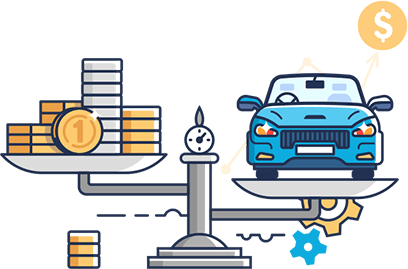
We Buy Less-Than Perfect Cars
Signs You Need To Repair A Brake Line
Brake lines are critical components to your vehicle’s ability to operate safely.
They should be maintained on a regular basis in order to make sure they’re ready to save you from a collision on the road.
What Is A Brake Line?
Your brake lines are integral to your car’s brake performance. They transform the pressure from your pedal into stopping power through a hydraulic brake system, which uses fluid to transfer the pressure created by your foot pressing the brake pedal.
The brake fluid is stored in a master cylinder and transferred via the brake lines to brake calipers whenever the brake pedal is depressed.
How Do I Know If My Brake Line Is Bad?
Despite being made of steel designed to endure the elements, brake lines can eventually fail.
With that in mind, understanding when they’ve started to falter can save you time, money, and life.
Common Symptoms of A Bad Brake Line
Leaking Brake Fluid: Leaking brake lines are the most common symptom of a failing brake system. While brake lines are usually made of steel and durable enough to withstand significant pressures, they still experience wear and tear.
Brake lines that are worn down or damaged are prone to leaks. A complete failure can even result in brake fluid leaking out wherever pressure is applied to the brake pedal.
Corrosion: Extended exposure to the elements can result in corrosion on the brake lines. Built up corrosion can cause the brake lines to weaken and, therefore, leak.
Corrosion is particularly common in colder climates due to vehicles being driven on roads that have been salted in order to combat ice.
Brake Warning Light: A lit brake light indicator is a clear sign that brake line failure has occurred. The brake warning light turns on when the sensors on the brake pads identify significant wear or when brake fluid drops below a designated threshold.
Visible Distress: Checking under your vehicle, if possible, can yield signs of visible distress. Drips on the interior of your wheels, rust spots along lines, and fluid streaks are all indications of corrosion or damage that should be attended to.
Knowing when to replace brake lines is also key.
While wear and tear will impact your brake lines, anything that isn’t unusual is to be expected. That said, brake lines typically need replacement around 100,000 miles.
Our expert evaluators can help you get an accurate estimate for your car's value, FAST!

Can I Drive With A Bad Brake Line?
In short, no.
It is in your best interest not to continue driving with a broken brake line. Even small leaks can compromise the total efficiency of your brake system and cause a safety issue.
Your best bet is to pull over somewhere safe and call in a tow for your vehicle.
Should your brake line fail while driving the vehicle, take these actions immediately:
Pump the brake pedal repeatedly to build up some pressure in the brake line and give it some more braking action.*
Pull over even if the leak is small and get your car towed.
Don’t pull the parking brake unless you’re driving very slowly. Pulling your parking brake at a high speed may cause your vehicle to spin out and even further damage to your brake system.
*Note: Don't pump the brakes if you have an ABS (Anti-lock Braking System) on your car. Instead, press and hold the brakes hard.
How Much To Replace Brake Lines?
Brake line replacement costs can vary based on the type of vehicle. The estimated average falls between $20 and $500 for each brake line. Labor costs range between $40-$50 with the parts themselves costing $150-$275 on average.
Total replacement of your brake lines involves removing and replacing all four brake lines with completely new components. This procedure can range anywhere from $1000-$2000 depending on the type of vehicle.
Types Of Brake Lines
Steel Brake Lines - The most common type of metal used in brake lines is galvanized mild steel. It’s used for its durability, accessibility, and affordability. That said, steel rusts and is difficult to bend.
Soft Steel Brake Lines - Composed of low-carbon steel, soft steel is (as its name might suggest) easier to bend. It is also coated with Polyvinyl Fluoride in order to combat rust, making it a more expensive option for brake lines.
Stainless Steel Brake Lines - Three to four times more expensive, but appreciated for their resistance to heat and imperviousness to rust. Often a choice as an upgrade made by enthusiasts.
Nickel-Copper Hard Lines - Nickel-copper hard lines have the strength of steel, are impervious to rust, and can be bent with ease. Their 90-10 copper to nickel design also makes them rather affordable. They are, however, difficult to find locally.
What Are My Options If I Don’t Want To Repair My Brakes?
CarBrain specializes in buying less-than-perfect cars, including yours with the broken brake line!
At CarBrain, we aim to make sure your entire process goes as smooth and easy as possible. It’s so easy, we can break it down into three simple steps:
Get your free quote! Simply enter basic information about your car and you’ll receive a free quote within 90 seconds.
Schedule your pickup within 24-48 hours! If you’re happy with your quote, you’ll be able to schedule your vehicle retrieval with one of our partners within your area. They’re trusted to come to you at a time that works best for you.
Complete your sale! With one short inspection and transfer of your title, you’ll receive the amount you were quoted without any haggling whatsoever. Your vehicle is taken off your hands and money is put in them!
Towing is on us, so you’ll never have to worry about additional fees taking away from the profits you take home.
Contact CarBrain today and sell your car without leaving the comfort of your own home!


